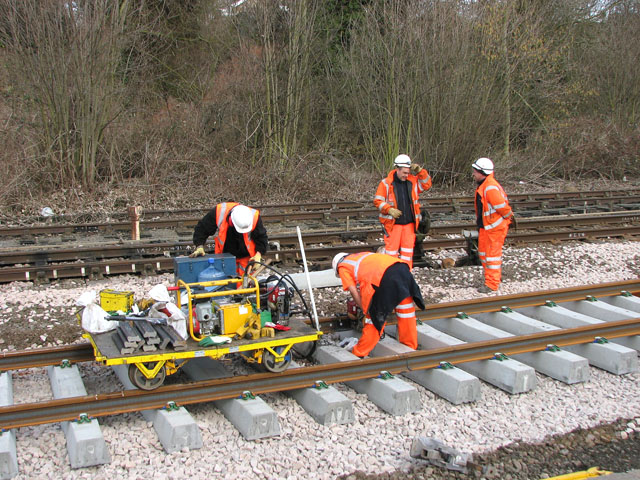Building back better with apprenticeships
Contents |
[edit] Introduction
During National Apprenticeship Week 2021 (8 - 14 February) the Government announced sector specific traineeship pilots in construction and rail to help young people gain the skills and confidence they need. The initiative will enable more young people to progress in their careers and potentially complete their apprenticeships more quickly.
Apprenticeships and Skills Minister Gillian Keegan feels the programme can benefit individuals by giving them “the chance to earn while you learn,” while opening up new career paths that can transform lives.” It can also benefit business by “giving access to new talent from all backgrounds,” she added.
Apprenticeships and traineeships play a key part in the Government’s plan for jobs, which is designed to protect, support and create jobs for all ages. During the COVID-19 pandemic, apprentices worked on the front line, with many playing important roles. At the Science and Technology Facilities Council, advanced engineering apprentices Jack Day, Christopher Robinson and Christopher Young helped produce 20 years’ worth of mechanical ventilators in just 12 weeks.
[edit] Opening doors to construction and engineering jobs
Since 2013, the traineeship programme has helped nearly 120,000 young people get on the career path. Figures for the academic year 2019/20 show that 66% of trainees get a job, take up an apprenticeship or go on to further study within six months of completing their programme.
The apprenticeship programmes last between six weeks and 12 months and focus on developing vital employability skills. These are offered alongside additional English, maths and digital skills and combined with a work placement lasting a minimum of 70 hours.
Steve Radley, Director of Strategy and Policy at CITB says, “Getting more college students into construction jobs is a big challenge which the construction traineeship should make a lot easier by providing a springboard for learners to start work or an apprenticeship. With job opportunities growing in construction, this is the right time for industry, Government, colleges and CITB to work together on practical solutions to bridge the gap between further education (FE) and work. Starting with bricklaying and moving on to the other occupations in a few months, we can make real progress.”
Neil Robertson, Chief Executive at the National Skills Academy for Rail (NSAR) adds, “Through traineeships, NSAR is delighted to be creating new opportunities for talent to access the rail sector. It is critical that we accelerate our ambitions to engage, attract and recruit for industries’ future skills needs. The development and delivery of high quality traineeships will be a key entry point for members alongside apprenticeships, T-Levels and Kickstart. I am pleased that NSAR, with the support of side key industry leads and the Government, has been able to establish this provision in a collaborative, coherent and timely manner.”
At its heart, the traineeship gives employers more opportunities to create relevant, engaging and work relevant training, alongside quality partners.
[edit] Government apprenticeship incentives
As of February 2021, almost 19,000 applications have been submitted by employers. To support employers to take on more apprentices, the Government is offering up to £2,000 for each new apprentice they hire. This cash boost is available until March 2021, so businesses can create even more opportunities and give more people the life changing chance to start a great career.
Employers can also apply for a £1000 cash boost to help them take on new trainees.
[edit] Related articles on Designing Buildings
- Apprenticeship Levy transfer service.
- Apprenticeships levy.
- Civil engineer quashes apprenticeship myths.
- Construction apprenticeships.
- Construction Industry Training Board CITB.
- Get ready for green jobs and upgrade projects.
- Industry placement CSCS card to help learners into construction.
- Organisations prompt government to Build Back Green.
- Payments for recruiting new apprentices.
- Protection for apprenticeships.
[edit] External resources
Featured articles and news
Gregor Harvie argues that AI is state-sanctioned theft of IP.
Heat pumps, vehicle chargers and heating appliances must be sold with smart functionality.
Experimental AI housing target help for councils
Experimental AI could help councils meet housing targets by digitising records.
New-style degrees set for reformed ARB accreditation
Following the ARB Tomorrow's Architects competency outcomes for Architects.
BSRIA Occupant Wellbeing survey BOW
Occupant satisfaction and wellbeing tool inc. physical environment, indoor facilities, functionality and accessibility.
Preserving, waterproofing and decorating buildings.
Many resources for visitors aswell as new features for members.
Using technology to empower communities
The Community data platform; capturing the DNA of a place and fostering participation, for better design.
Heat pump and wind turbine sound calculations for PDRs
MCS publish updated sound calculation standards for permitted development installations.
Homes England creates largest housing-led site in the North
Successful, 34 hectare land acquisition with the residential allocation now completed.
Scottish apprenticeship training proposals
General support although better accountability and transparency is sought.
The history of building regulations
A story of belated action in response to crisis.
Moisture, fire safety and emerging trends in living walls
How wet is your wall?
Current policy explained and newly published consultation by the UK and Welsh Governments.
British architecture 1919–39. Book review.
Conservation of listed prefabs in Moseley.
Energy industry calls for urgent reform.
























